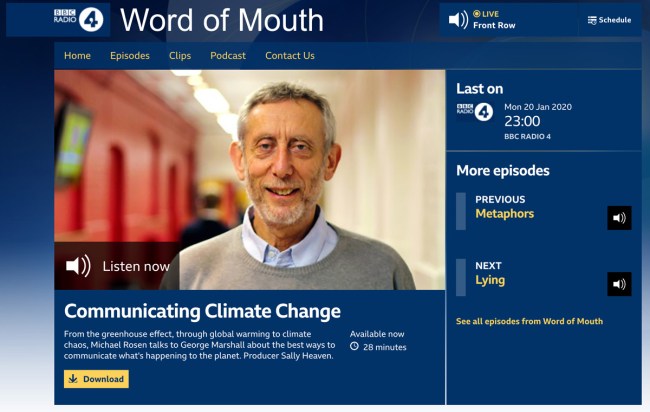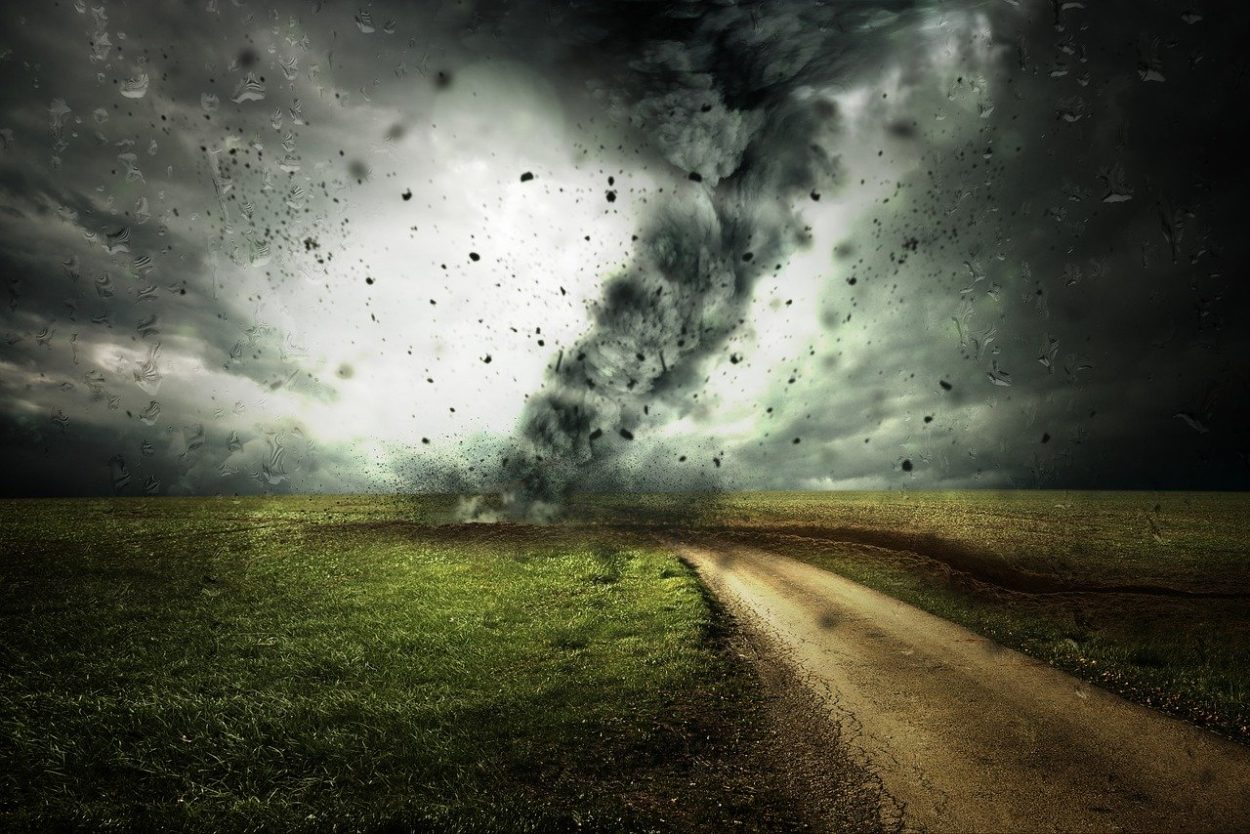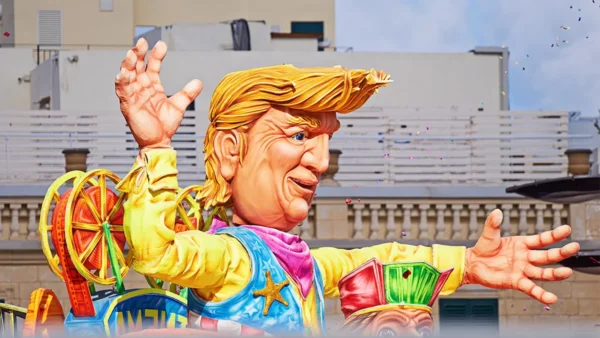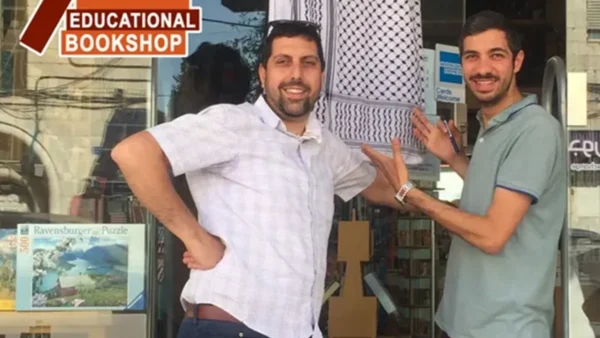Climate change has become such a clear, species-threatening emergency that sometimes it feels strange to talk or write about anything else.
Yes, I know, Covid-19. But a pandemic, although immensely destructive, will end eventually. In the longer term, climate change is a much bigger threat to our survival on this planet.
Most of the things I spend my day thinking about are completely unimportant compared to the stunning reality that unless we quickly pull off a radical global shift in the way we live, we will make the world at best difficult and at worst impossible to live in. And based on current trends, it seems we’re not going to make that shift in time.
And yet I write stories in which climate change is either peripheral or non-existent. I review books to which the same applies. I tweet about politics or reading or writing, and I make observations about life that would be quite witty and apropos if it weren’t for the fact that the world is burning.
I feel, sometimes, as if I’m sitting on a jumbo jet that’s plummeting towards the ocean, and my response is to turn to the guy in the seat next to me and say, “I read a good book lately.”
What’s the appropriate response to the slow collective suicide of the human race?
The answer seems to be to talk and write about nothing else, to put everything else to one side and deal with the real and present danger that we are all ignoring. Talk about climate change every day, with everyone I meet, write about it here on the blog and in my books and short stories and non-fiction.
We did something like that with Covid-19. Everything else went on hold for a while, and we dedicated almost our entire attention to a virus. The news talked of nothing else. Social media was given over to virus talk. When I Skyped with my parents at the height of the pandemic in the UK, we kept trying to change the subject, but it kept coming back to coronavirus.
Maybe we should do the same thing with climate change. Or, speaking personally, perhaps I should talk and write about nothing else, devote all of my attention and creativity to talking about climate change and contributing to the drastic shift in societal mindset that we need.
But although that would be appropriate to the urgency of the crisis, it would not be true to who I am or how I feel. I have diverse interests; climate change is just one of the things I care about. I want to continue to write about the books I’ve read, my travels, random things that interest me, and so on.
And I’m not a climate scientist—I have nothing to add beyond things I’ve read, which are probably the same things you’ve read, in one form or another. The problem, at this stage, is not a lack of information. It’s a lack of action.
The Language of Climate Change
There’s also the problem that writing about climate change in a compelling way is very difficult. I listened to a fascinating BBC podcast recently in which British poet Michael Rosen interviewed George Marshall, founder of Climate Outreach, about the language we use to describe climate change.

The very term “climate change” that I’ve been using in this post, for example, fails to communicate the urgency of the situation—it makes people think of a slow, gradual change, not the sudden, unpredictable spiral of chaos on which we have embarked.
The main alternative, “global warming”, on the other hand, puts the emphasis only on increased temperatures, leaving out the whole gamut of freakish and dangerous weather that we’re getting as the climate goes haywire.
Some are using terms like “climate crisis” and “climate emergency”, which seem like an improvement, but Marshall believes that existing words won’t work—we’ll need to invent new words to describe what is a completely new experience for our species.
It sounds like a tall order, but we’ve done it for all of the technological advances of modern life, so I’m sure we can do it for climate change. Suggestions in the comments, please.

Telling Better Stories
We also need to think carefully about the metaphors and images we use. I’ve always thought that the image of a poor polar bear stranded on melting ice was quite effective in communicating the effects of climate change, but Marshall says it’s a disaster.
He interviewed people in India about how they conceptualised climate change, and they kept saying it was about polar bears. This made them think of it as a distant problem that wouldn’t affect them personally—polar bears and ice floes are about as far from India as you can get.
If you want people to care about climate change, Marshall says, you need to talk about how it will affect them—in India’s case, deadly heatwaves, vicious cyclones, huge coastal cities flooded by rising seas, etc.
We also need better stories. Climate change doesn’t fit the usual narrative of an individual hero overcoming obstacles to reach a goal. We need stories of collective action and collective responsibility, and those are harder to tell.
If we can find ways to tell those stories, however, we have a chance of doing something special: not just surviving as a species, but reaching a new level of societal evolution, by taking the cooperation and collective action that defined early human societies and applying it on a global scale.
Again, it’s a tall order, but we don’t have a choice. Evolve or die. That’s where we are. And we all have a part to play through the stories we tell and the action we take. What will you do?




There are 8 comments
Thanks, Andrew, this is a great wake-up call and very timely as the climate change/global heating debate has been set aside in the news because of Covid-19. But I was pleased to read in today’s Guardian that Ed Miliband is proposing a scheme for young people to work in developing green industries post-pandemic. On a personal level I’m going to listen to the Word of Mouth podcast and read Weather by Jenny Offill, a novel shortlisted for the Women’s Prize on the subject of climate change. And think generally about reading and blogging about fiction in which climate change and its effects are part of the narrative. If just to keep it at the forefront of our minds.
Hi Mandy, Oh, I hadn’t heard about Weather—I’ll check that one out. There are plenty of climate change novels out there, but to me there should be a lot more, given how huge an issue it is. I’ll be interested to see Offill’s take on it. Thanks for letting me know about it!
Hope you enjoy the Word of Mouth podcast. I listen to it quite regularly and can recommend it to any language lovers. This was an episode I felt motivated to write about because it chimed in with other things I’ve been thinking about lately, but there are loads more I’ve enjoyed.
Hi,
The school I attended when I was a child leaked anytime it rained, hence Dad would not send us to school on rainy days. My interest in the weather started then. I would pray for rain every Sunday night as I did not learn my spelling for the Monday morning test.
In Jamaica we have started to see signs of climate change. We are losing some of our beaches as the water level is rising at an alarming rate. My main concern is the heavily populated coast. Many attempts have been made to clear people from low lying areas and river banks to no avail. Unfortunately my people will feel before they learn.
Stay safe,
Jennifer
Hi Jennifer
Ah, that’s a good incentive to take a keen interest in the weather! Unfortunately it wouldn’t work in England—there would only be about ten school days a year.
It’s amazing how quickly it’s happening, isn’t it? For most of my life, climate change was something worrying coming our way in the future, but now we’re seeing it. So many people talk about it when I travel to different places. In Greenland last year, the mayor of one of the villages said he could no longer travel by dog sled to a nearby town in winter because the ice wasn’t strong enough. In the Slovenian Alps, we stayed with a guy who said the winter snows now melt one or two months earlier than when he was young. In the Caribbean, of course, rising sea levels are a big problem, as well as stronger hurricanes. It’s everywhere.
Your last line made me think of a Barbadian saying: “Hard ears yuh won’t hear, own way yuh gine feel.” That could be the motto of the human race in the coming decades.
I love this post. And I haven’t listened to that podcast, but I have heard him interviewed (maybe on the Guardian Books podcast, otherwise it was BBC’s Books and Authors) and thought his ideas were quite remarkable. So simple and yet so complex.
I’ve been working through some recommendations on my TBR which I’d previously set aside because I found them too troubling (war, slavery, poaching, etc.), but although it’s informative and we do need to know things in order to change our minds and habits, it’s still got to translate into action.
And right now it’s even harder to stick with the simplest green changes we’d made for our household years ago (reusable packaging, no plastic, etc.) because even other green-minded businesses have been forced to adjust to disposable “alternatives” for curbside and pick-up policies during Covid-19. Even our direct farmer relationships have felt forced to invest in “fresh” cardboard and paper bags for each delivery, whereas previously reusing until they were shredding was quite acceptable for all involved. I’m so grateful to have a steady supply of good food under these trying circumstances (and just in general, too) but my footprint has definitely gotten heavier in the past few weeks, not lighter.
I agree, the translating into action is the hard part. It’s especially tough with climate change because the things we need to do to fix it are so large scale. Changing our own habits and reducing our personal footprints is definitely important, but while our governments are still subsidising fossil fuels and stuck on a model of infinite growth, it feels so small. It’s easy to feel paralysed because the things within our grasp are too small, and the things we really need to do are too big, and I think that’s a big part of the problem. And yes, I hear you on the Covid-19 issue—our eco-activities definitely took a back seat to staying healthy and virus-free. But the good news is that all those grounded planes and locked-down cars probably more than offset our heavier footprints 🙂
Have you read Amitov Ghosh’s book The Great Derangement? It’s all about how literature has refused to include climate issues in it and how it is imperative that it does. And then read his most recent book Gun Island, and see how he has decided to do it. It doesn’t mean that things have to be all climate change all the time, but that it needs to be an element of the story in some way; it can’t be ignored.
Hey Stefanie! No, I haven’t read either of those, but I think I will now. Thanks for the recommendations!!